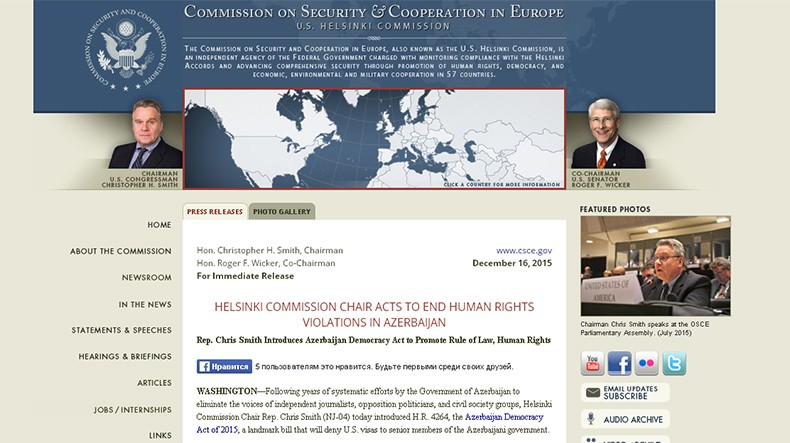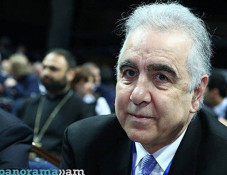
US Congress urges to deny visas to senior Azerbaijani officials, Secretary General of CoE launches inquiry of Azerbaijan authorities’ activities
Following years of systematic efforts by the Government of Azerbaijan to eliminate the voices of independent journalists, opposition politicians, and civil society groups, Helsinki Commission Chair Rep. Chris Smith on 16 December 2015 introduced the Azerbaijan Democracy Act of 2015, a landmark bill that will deny US visas to senior members of the Azerbaijani government, according to a statement released by the US Helsinki Commission.
Smith said the United States can no longer remain blind to the appalling human rights violations that are taking place in Azerbaijan. “Journalists and activists are routinely arrested and imprisoned; opposition politicians are in jail and elections are not free and fair; human rights lawyers have been harassed and disbarred; and religious freedom is under attack,” he noted.
According to the statement, in addition to denying US visas to senior leaders of the Government of Azerbaijan, those who derive significant financial benefit from business dealings with senior leadership, and members of the security or judicial branches, the Azerbaijan Democracy Act also expresses the sense of Congress that financial penalties should be considered. Sanctions could be lifted when the Azerbaijani government shows substantial progress toward releasing political prisoners, ending its harassment of civil society, and holding free and fair elections.
“It is unacceptable that senior members of the Azerbaijani government are free to visit the United States while courageous women and men like investigative journalist Khadija Ismayilova, attorney Intigam Aliyev, opposition politician Ilgar Mammadov, and activist Anar Mammadli are locked away in prisons with inadequate access to legal or even medical assistance,” Rep. Smith said. “If they can pay the price for standing up for human rights, the least we can do is to stand with them.”
According to the statement, after the introduction of the legislation, Rep. Smith chaired a hearing to examine Azerbaijan’s persecution of the journalist Khadija Ismayilova, who was sentenced to 7.5 years in prison.
Speaking at the hearing, Amnesty International advocate T. Kumar said authorities have used “any tactic under the sun” to target journalists like Ismayilova. Shelly Han, a Helsinki Commission staff member who attended a recent Ismayilova court hearing, said the civil society community has been subdued, but has been inspired by Ismayilova’s defiance, RFE/RL reports.
The website of the Armenian American newspaper Asbarez reports that ANCA Executive Director Aram Hamparian welcomed Congressman Smith’s leadership in introducing the Azerbaijani Democracy Act.
“This measure, aimed first and foremost at protecting the rights of Azerbaijani citizens, can, in a broader sense, also potentially contribute to prospects for regional peace, by requiring that the United States – and our international partners – hold Ilham Aliyev and his regime accountable.
The fact is that Azerbaijan’s domestic repression mirrors its regional aggression. We need to challenge both,” he highlighted.
For his part, the Secretary General of the Council of Europe, Thorbjørn Jagland, launched an official inquiry into Azerbaijan's implementation of the European Convention on Human Rights, according to a statement published on CoE website. The statement says it is the first time Secretary General Jagland has used this ‘rare’ measure.
The Secretary General pointed to the fact that judgments from the European Court of Human Rights have highlighted an arbitrary application of the law in Azerbaijan, notably in order to silence critical voices and limit freedom of speech. "In these worrying circumstances, and given the lack of positive steps to address the situation, I will send representatives to Azerbaijan to seek explanations from the authorities concerning the country's implementation of the Human Rights Convention,” he said and particularly expressed his ‘alarm’ over individuals being deprived of their liberty due to an abuse of power by the country’s legal authorities.
The Unrepresented Nations and Peoples Organization (UNPO) issued a statement to welcome Thorbjørn Jagland’s decision and to express hope that this investigation will also highlight the constant violation of minority rights in Azerbaijan, which affects, among others, the Lezghin and Talysh communities.
The head of the Monitoring Centre for Political Prisoners of Azerbaijan, Elshan Hasanov, told the website Caucasian Knot that the CoE Secretary General’s decision is another prove that further right violations in Azerbaijan and the unaddressed problem of political prisoners ‘cannot remain traceless.’
“It is not needed to finally to bring the relations with the Council of Europe to a dead end restricting the cooperation with that organisation. The expected pre-New-Year pardoning can become a good chance to finish up with the political prisoners’ problem. Otherwise, the criticism towards Azerbaijan will continue having a negative effect on the international image of the country,” Hasanov said.
Human Rights Watch also commented on the initiatives of the Helsinki Committee and Secretary General of the Council of Europe. “Some of Azerbaijan’s international partners are finally taking exceptional steps to signal their alarm over the government’s serious crackdown on human rights,” said Jane Buchanan, the associate director of Europe and Central Asia Division and of Children's Rights Division of the organisation.
According to Buchanan, these steps should send an ‘unmistakable message’ to the Azerbaijani government that its crackdown, underway for nearly two years with the clear intention to decimate civil society, will come with a price. She called on Azerbaijan’s other key partners, namely the European Union and its member states, to consider equally meaningful and concrete steps, without which there is little hope of ‘reversing Azerbaijan’s devastating human right trajectory.’
Index On Censorship published , which highlights champions against censorship and those who fight for free expression against the odds in the fields of arts, journalism, activism and technology and whose work had a marked impact in 2015. The list includes Azerbaijani journalists, namely Arzu Geybulla, persecuted by the Azerbaijani authorities for her work at Istanbul-based Armenian newspaper Agos, and imprisoned reporter Khadija Ismayilova, whose colleagues launched The Khadija Project, a solidarity campaign to continue her investigations of corruption in the ruling circles of Azerbaijan.
Newsfeed
Videos






























